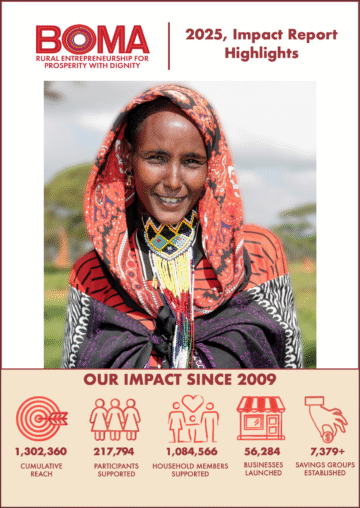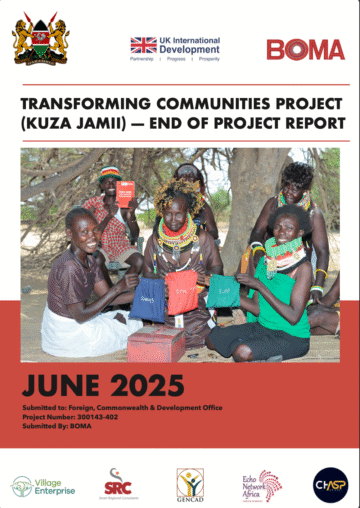| “Africa is mystic; it is wild; it is a sweltering inferno; it is a photographer’s paradise….It is the last vestige of a dead world or the cradle of a new one…It is all of these things but one thing – it is never dull.” Beryl Markham, West with the Night |
|
Dear Friends:
As the founder of The BOMA Project, I have the great fortune to spend time with the pastoral nomads of northern Kenya during several extended visits each year. Last night I arrived in the cosmopolitan city of Nairobi. In a few days I will make the long trek to northern Kenya to visit with our business groups and the local residents who lead the Rural Entrepreneur Access Project. I invite you to travel with me through our blog, BOMA Nomad, and meet the people who are at the heart of what we do.
My journey comes in the midst of swirling headlines about the East Africa drought. The photographs that have been broadcast across the world are heart-wrenching. But that is not what you will see from us. Instead, I invite you to travel with me and meet people who dispel the common notion that Africa is incapable of solving its own problems. Nalepicho from Lependera village is one of those people. On my last visit, as I sat in Nalephicho’s hut sharing a cup of tea, she told me, “Mama Rungu, things are different for us now. When the drought came, we did not run to the missionaries. We did not run to the government officials. Instead, we ran to ourselves.” Here, in this small village in the middle of the Kaisut Desert, is the beginning of an African renaissance.
So travel with me – it is always an adventure. We’ll race across deserts, sleep out under the brilliant African sky and fall asleep to the sounds of warrior songs and hyena whoops. We’ll meet elders with special powers and an old woman who can tell the future. And despite all the adversity that surrounds us, we will sing and dance and then sing some more.
Here at BOMA, we are learning as we grow. What is most astounding is how our business owners have become the lifeblood of the villages – selling small amounts of food and essentials at affordable prices and providing credit to neighbors at a time when there is little cash in the economy. The drought has forced the remaining livestock far from the villages and every day we pray for the rain that will revive an essential pastoralist economy. In the meantime, it is the small BOMA businesses, and their shared savings, that provide a source of money to the woman and children who are left in the village to survive on their own. During the now-common drought periods, BOMA businesses have become a sustainable and inexpensive source of food aid because sharing is part of life here. In South Africa they call it “ubuntu”, a Zulu word that means you are only human if you are connected to and helping out other humans.
In October we will launch 200 new businesses. This will bring us to a total of 720 businesses in the REAP program, with 2,688 adults who can feed and educate more than 14,000 children. Our work is more urgent than ever as we establish life-saving, income-generating businesses in northern Kenya. I want the stories in our blog to reach out to you – to your ubuntu – as we work with people who are determined to overcome adversity and prosper.
I hope you will join me.
 Kathleen Colson
CEO & Founder
PS. Read below about the new addition to the BOMA team – Margaret (Meg) Harris has joined The BOMA Project as our new Executive Director.
|
|
The BOMA Project’s New Executive Director
|
|
Margaret (Meg) Harris joined the BOMA Project as Executive Director in August 2011. She has twenty years of experience in project management, fundraising and evaluation for international organizations.
Meg previously served as Director of Philanthropic Partnerships at the Salzburg Global Seminar, where she was responsible for donor cultivation, researching new revenue streams, and developing proposals and reports for foundation, government and corporate support. Previous responsibilities at the Salzburg Global Seminar, an international leadership development organization, included session direction; management of the five-year project, Sustainability, Education and the Management of Change in the Tropics (SEMCIT) in partnership with EARTH University; and research, development and start-up of new partnership projects.
Before joining the Seminar in 1999, Meg worked with Associates in Rural Development (ARD), Partners for International Education and Training (PIET), and the Overseas Development Network. She spent her formative years in Nigeria, Zambia and Kenya and earned a B.A. from Carleton University and a M.A. in Adult Education from the University of Toronto, Canada. |












